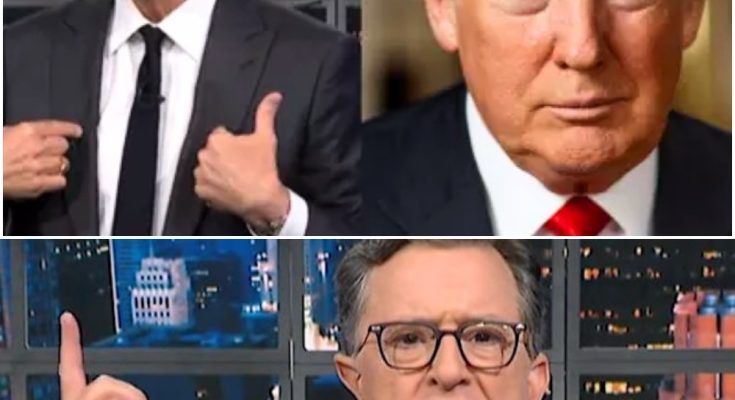On Monday, July 21, 2025, Stephen Colbert returned to the stage of The Late Show at the Ed Sullivan Theater in New York City, delivering a monologue that reverberated across the media landscape. Just days after CBS announced the cancellation of The Late Show effective May 2026, and following President Donald Trump’s gleeful celebration of the decision, Colbert unleashed a succinct yet powerful message directed at the president: “Go f— yourself.” The bleeped-out expletive, delivered with a blend of satire and raw defiance, encapsulated a moment of unfiltered truth in a media environment increasingly fraught with political and corporate pressures. This 2,000-word exploration delves into the context, impact, and implications of Colbert’s fiery response, examining the interplay of late-night television, corporate decisions, and political influence in the Trump era.
The Cancellation Shockwave
The announcement on July 17, 2025, that CBS would end The Late Show with Stephen Colbert after its 2025-26 season sent shockwaves through the entertainment industry. The decision marked the conclusion of a 33-year franchise that began with David Letterman in 1993 and continued under Colbert’s stewardship since 2015. CBS framed the cancellation as “purely a financial decision” driven by the declining profitability of late-night television, citing losses reportedly between $40 million and $50 million annually. Yet, the timing raised eyebrows: the announcement came just three days after Colbert sharply criticized CBS’s parent company, Paramount Global, for paying a $16 million settlement to President Trump over a disputed 60 Minutes interview with Kamala Harris from October 2024.
Colbert had called the settlement a “big fat bribe,” suggesting it was a strategic move to appease Trump’s administration as Paramount sought Federal Communications Commission (FCC) approval for an $8 billion merger with Skydance Media. The proximity of these events fueled speculation that the cancellation was politically motivated, a theory amplified by Democratic senators like Elizabeth Warren and Adam Schiff, who demanded transparency about potential political pressures. Trump’s jubilant reaction on Truth Social, where he wrote, “I absolutely love that Colbert got fired. His talent was even less than his ratings,” further stoked the controversy, framing the cancellation as a personal victory over one of his most vocal critics.
Colbert’s Return: Gloves Off
Colbert’s first monologue since the cancellation was a masterclass in balancing humor, defiance, and emotional resonance. Addressing a rambunctious audience chanting his name, he opened with a quip about cancel culture: “I’m gonna go ahead and say it: Cancel culture has gone too far.” The line set the tone for a monologue that oscillated between biting satire and pointed critique. Reflecting on the cancellation, he said, “Over the weekend, it sunk in that they’re killing off our show. But they made one mistake: They left me alive.” This action-hero-esque declaration underscored his resolve to make the most of his remaining ten months on air.
The centerpiece of the monologue was his response to Trump’s gloating. Framing his retort with mock outrage, Colbert said, “How dare you, sir? Would an untalented man be able to compose the following satirical witticism?” He then appeared in an “Eloquence Cam” segment, staring directly into the camera with a clipped New York accent and delivering the now-iconic line: “Go f— yourself.” The bleeped expletive drew a roaring ovation from the audience, encapsulating years of Colbert’s sharp critiques of Trump in a single, unfiltered moment. The line was both a comedic jab and a declaration of independence, signaling that Colbert would not bow to corporate or political pressures in his final season.
A Show of Solidarity
Colbert’s monologue was bolstered by an unprecedented display of solidarity from his late-night peers. In a segment spoofing a viral Coldplay concert “kiss cam” incident, the Late Show cameras panned to reveal Jimmy Fallon, Jon Stewart, John Oliver, Seth Meyers, Adam Sandler, Anderson Cooper, Andy Cohen, and others in the audience. The segment, featuring “Weird Al” Yankovic and Lin-Manuel Miranda performing Coldplay’s “Viva La Vida,” culminated in a satirical jab: an animated Trump cuddling the Paramount logo on the kiss cam, a pointed reference to the perceived coziness between Paramount and the Trump administration.
Jon Stewart, Colbert’s longtime mentor from their Daily Show days, delivered a particularly scathing critique on his own show, lambasting CBS and Paramount for what he called “fear and pre-compliance” in the face of a “vengeful and vindictive” president. Leading a choir in a chant of “go f— yourselves” directed at corporations capitulating to Trump, Stewart argued that the cancellation reflected a broader institutional cowardice rather than a purely financial decision. Other hosts, including Jimmy Kimmel, who posted a six-word expletive-laden message against CBS, and Sandra Oh, who declared a “plague on CBS and Paramount” during her Late Show appearance, echoed this sentiment.
The Financial vs. Political Debate
CBS’s insistence that the cancellation was financial has been met with skepticism. The Late Show was the top-rated late-night broadcast show, averaging 2.417 million viewers across 41 new episodes in 2025, according to Nielsen ratings. However, the late-night genre has faced economic challenges for years, with ad revenue dropping 50% since 2018 due to audience fragmentation and the rise of streaming platforms. Reports from Puck’s Matthew Belloni and other sources suggest The Late Show was losing significant money, with estimates ranging from $40 million to $50 million annually. Colbert himself acknowledged this, joking, “I could see us losing $24 million, but where would Paramount have possibly spent the other $16 million? Oh yeah,” alluding to the Trump settlement.
Yet, the timing and context suggest more than economics at play. Paramount’s $16 million settlement with Trump, coupled with its need for FCC approval for the Skydance merger, has led to accusations of political appeasement. The Writers Guild of America called for an investigation, labeling the settlement a “bribe” to curry favor with Trump’s administration. Senators Warren, Schiff, and Ron Wyden questioned whether a “secret side deal” existed, noting that Skydance’s CEO, David Ellison—son of Trump ally Larry Ellison—had been seen with Trump at UFC events. CBS and Skydance have denied any political motives, but the optics, as The Hollywood Reporter noted, “suck on a slew of levels.”
Colbert’s Legacy in the Trump Era
Colbert’s tenure on The Late Show has been defined by his incisive commentary on Trump, transforming him from a satirical conservative persona on The Colbert Report to a principled, erudite voice of resistance. After a slow start in 2015, he overtook The Tonight Show in ratings by 2017, fueled by his sharp monologues during Trump’s first term. His Catholic faith, love for Lord of the Rings, and belief in American decency often shone through, making him a unique figure in late-night comedy. As The Guardian’s Adrian Horton wrote, Colbert’s ability to blend humor with moral clarity made him “the reverend father of late-night TV,” a role that resonated deeply in an era of political chaos.
His Monday monologue exemplified this legacy. By daring CBS to pull him early, Colbert positioned himself as a martyr for free speech, a stance Time magazine called both “brave” and “foolish” given Trump’s litigious history. If CBS allows him to continue unchecked, he’ll spend ten months lampooning Trump and the network; if they intervene, it would validate claims of political censorship. Either way, Colbert’s defiance ensures his final season will be a cultural lightning rod.
The Broader Implications
The cancellation of The Late Show and Colbert’s response highlight the precarious state of late-night television and media independence. The genre, once a cultural touchstone, has been in decline, with hosts like Trevor Noah, James Corden, and Taylor Tomlinson exiting in recent years. The New Yorker described the cancellation as a “concerning nail in the coffin for comedy,” reflecting a broader erosion of platforms for political satire. In an era where Trump’s administration exerts significant influence over media through regulatory bodies like the FCC, the cancellation raises questions about corporate self-censorship.
Stewart’s “fear and pre-compliance” critique resonates here, suggesting that institutions are preemptively bowing to Trump’s vindictive tendencies. The animated kiss cam image of Trump embracing the Paramount logo captured this sentiment, symbolizing a perceived capitulation by corporate media. Meanwhile, Trump’s targeting of other hosts like Jimmy Kimmel and Jimmy Fallon indicates a broader campaign against late-night critics, with Fox News’s Greg Gutfeld praised as a preferable alternative.
Public and Industry Reaction
The public response has been intense, with anti-Trump protesters gathering outside the Ed Sullivan Theater, holding signs reading “Colbert Stays!” Social media has been ablaze with support for Colbert, with fans praising his courage and lamenting the loss of a vital voice. Celebrities like Jamie Lee Curtis, who declared, “They’re trying to silence people, but that won’t work,” have amplified the narrative of resistance. The industry, too, has rallied, with the Writers Guild and Democratic lawmakers calling for investigations into Paramount’s motives.
Colbert himself has remained defiant yet reflective. Addressing his audience’s support, he said, “Some people see this show going away as the sign of something truly dire. While I’m a big fan of me, I don’t necessarily agree with that statement.” He emphasized that The Late Show’s goal was to change how viewers felt at the end of the day, a “worthy goal” that he believes his team achieved.
Looking Ahead
As The Late Show enters its final season, Colbert’s Monday monologue has set the stage for a bold, unapologetic farewell. His “gloves are off” declaration promises ten months of unrelenting satire, potentially making the show a focal point of resistance against Trump’s influence. Whether CBS tolerates this or intervenes remains to be seen, but Colbert’s strategic defiance ensures that any attempt to silence him will come at a high reputational cost.
The cancellation also underscores the evolving media landscape, where traditional platforms like late-night TV struggle to compete with digital alternatives. Yet, Colbert’s ability to galvanize support—both from peers and the public—suggests that his voice will endure beyond May 2026. As The New York Times noted, the cancellation raises immediate questions about the intersection of media, politics, and corporate power, questions that Colbert’s final season is poised to confront head-on.
Conclusion: A Moment of Truth
Stephen Colbert’s “Go f— yourself” was more than a vulgar retort; it was a defiant stand against a president who celebrated his cancellation and a network accused of capitulating to political pressure. Delivered with the wit and moral clarity that have defined his tenure, the line crystallized a moment of resistance in a media landscape increasingly shaped by fear and compliance. Backed by his late-night peers and a fervent audience, Colbert has turned his cancellation into a rallying cry, ensuring that The Late Show’s final months will be anything but quiet. As he navigates this fraught terrain, Colbert’s legacy as a comedic truth-teller in the Trump era is secure, and his Monday monologue will be remembered as a defining act of courage in a time of uncertainty.



